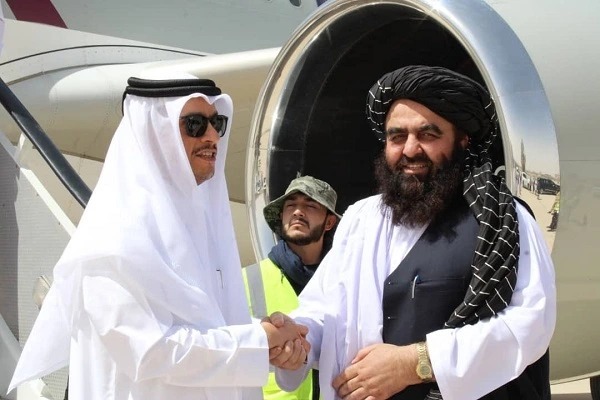Kandahar, Afghanistan, May 14: A high-level delegation from Qatar, led by Prime Minister Sheikh Mohammed bin Abdulrahman Al Thani, made an official visit to Afghanistan on Friday. The visit aims to enhance Qatar-Taliban ties, build trust, and promote practical cooperation between the two countries.
The delegation, which also included Abdullah Al-Khulaifi, the head of the Qatari State Security (Intelligence Service), indicated a comprehensive approach encompassing various areas, from development to security. During the visit, the Qatari delegation held a meeting with the Taliban’s Prime Minister, Mohammad Hassan Akhund, as confirmed by Zabiullah Mujahid, the spokesperson of the Taliban, via Twitter.
Mujahid’s tweet stated, “ In this meeting, the Prime Minister of that country emphasized strengthening the relations and adding the position of trust between the two countries, as well as practical cooperation in the educational, health, and profitable fields of Afghanistan. ” Qatar’s engagement with the Taliban dates back to 2013 when it allowed the Taliban to establish an office in Doha.
Qatar’s engagement with the Taliban dates back to 2013 when it allowed the Taliban to establish an office in Doha. Notably, Qatar has played a crucial role in facilitating discussions between the Taliban and the US government, leading to a peace deal on February 29, 2020.
Since the Taliban’s takeover in August 2021, the international community has criticized the Taliban’s policies, considering them regressive and contrary to the spirit of the Doha Agreement. Consequently, all the countries have refrained from recognizing the legitimacy of the Taliban regime. UN Secretary-General Antonio Guterres recently commented, “This is not the right time to engage with the Taliban,” following the International Conference on Afghanistan held in Doha on May 1-2, which did not involve Taliban representation.
Despite this reluctance, realpolitik has come into play in the region, with several regional players actively engaging with the Taliban on various matters, although they do not formally recognize the Taliban’s rule.
Given the significant Qatar-Taliban ties, Qatar, positioning itself as a “regional mediator,” seeks to elevate its geopolitical standing by playing a role in mediating between the Taliban and governments worldwide, particularly in the West.
During a trilateral foreign ministers meeting involving Afghanistan and Pakistan, China extended the inclusion of Afghanistan in its Belt and Road Initiative through the China-Pakistan Economic Corridor (CPEC). This development highlights China’s proactive engagement with the Taliban regime, aiming to establish economic interdependence with resource-rich Afghanistan.
India and Russia also focus on multi-level engagements with the Taliban leadership, aiming to address the Afghan crisis and prevent it from becoming a regional security nightmare. India has maintained its long-standing “people-to-people” connection by providing substantial humanitarian assistance and developmental grants to Afghanistan.
The visit of the Qatari delegation may prove to be a significant step towards the recognition of the Taliban regime in Afghanistan. However, for such recognition to materialize, the Taliban also needs to meet the international community halfway.






